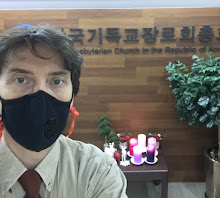The relationship between the Presbyterian Church in the
Republic of Korea and the United Church of Canada goes back a long time—even
before either church had been institutionally formed, back to 1898, when
mission personnel from the Presbyterian Church in Canada first arrived in
Korea. And since then the United Church has maintained a continuous presence in
Korea through some of the most difficult times in Korean history—the long years
of the Japanese occupation, the war years, the military dictatorships and the
struggle for democracy.
My role here, first of all, is to embody that relationship just by my presence
here on the ground, and secondly, to offer my gifts and skills to support the
PROK in its ministry here in Korea and beyond.
The PROK is very committed to ecumenical partnerships as part of its core
identity, working with partners both in Korea and abroad to respond to the
needs of the world. This really hit home for me this year when I was attending
the pre-assembly on Jeju Island: I saw first-hand how important it was to the
PROK to have representatives from its partner churches at their General
Assembly, as well as take part in high level discussions about the scope and
future of their relationships with the PROK and how they might participate together more fully in God's mission in the world.
 |
| Attendees at the PROK pre-assembly in September: representatives from Indonesia, Philippines, Taiwan, Thailand, Australia, USA, Hungary, Germany, USA, and Canada, as well as Korea |
In Korea, the PROK is an active member of the National Council of Churches in Korea (NCCK) and other groups working together for social transformation and human rights, and globally (like the United Church of Canada), a member of the World Communion of Reformed Churches, the World Council of Churches, and many other ecumenical bodies. The PROK receives mission co-workers from all over the world, and itself has many mission co-workers in other countries (at last count, 75 in 23 different countries.)
Even my Korean name (기 요한) reflects this ecumenical
orientation. The second part (요한, yohan) of course is just the
Korean equivalent of my first name, but the first part (기, ki) is short for Kidokkyojang,
which is the Korean name for the Presbyterian Church in the Republic of Korea.
This is also seen in the PROK logo. (Here I am trying to get my phone into position to get a photo of it.) The circle is designed
to symbolize the whole world, the ecumenical spirit, fellowship among
Christians. The 기of Kidokkyojang is here too, forming an arrow to represent
progress—movement forward in the spirit of hope, exodus from oppression,
liberation toward a new system of order, with the blue symbolizing freedom,
hope, and youth, and the purple to symbolize ordeal, endurance, and justice.
In the General Assembly Office right now we have mission co-workers from the Philippines, Japan, and Canada, working alongside the regular Korean staff. Here are some of my colleagues in the Partnership and Ecumenical Relations Department, hard at work!




Comments
Post a Comment